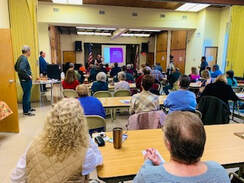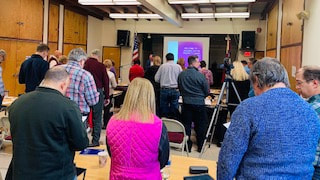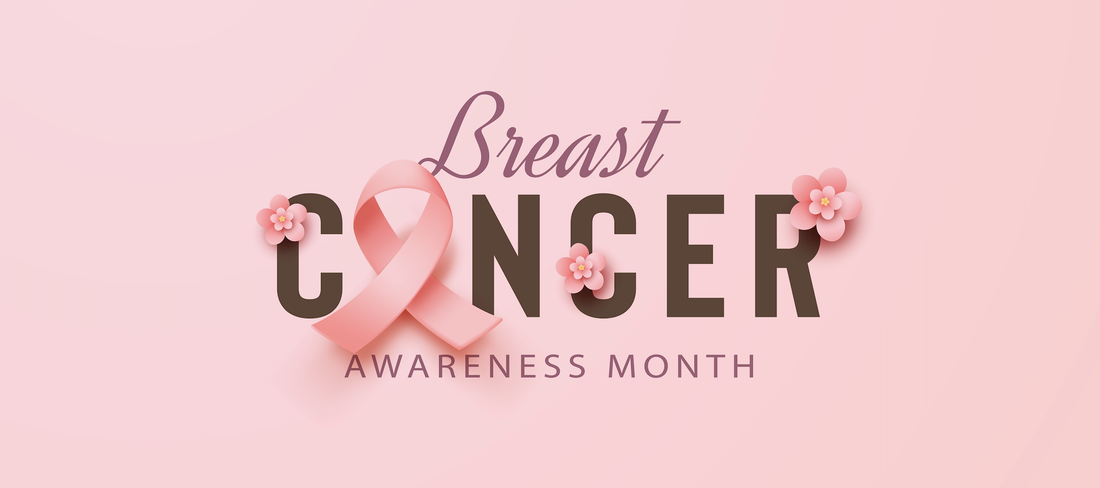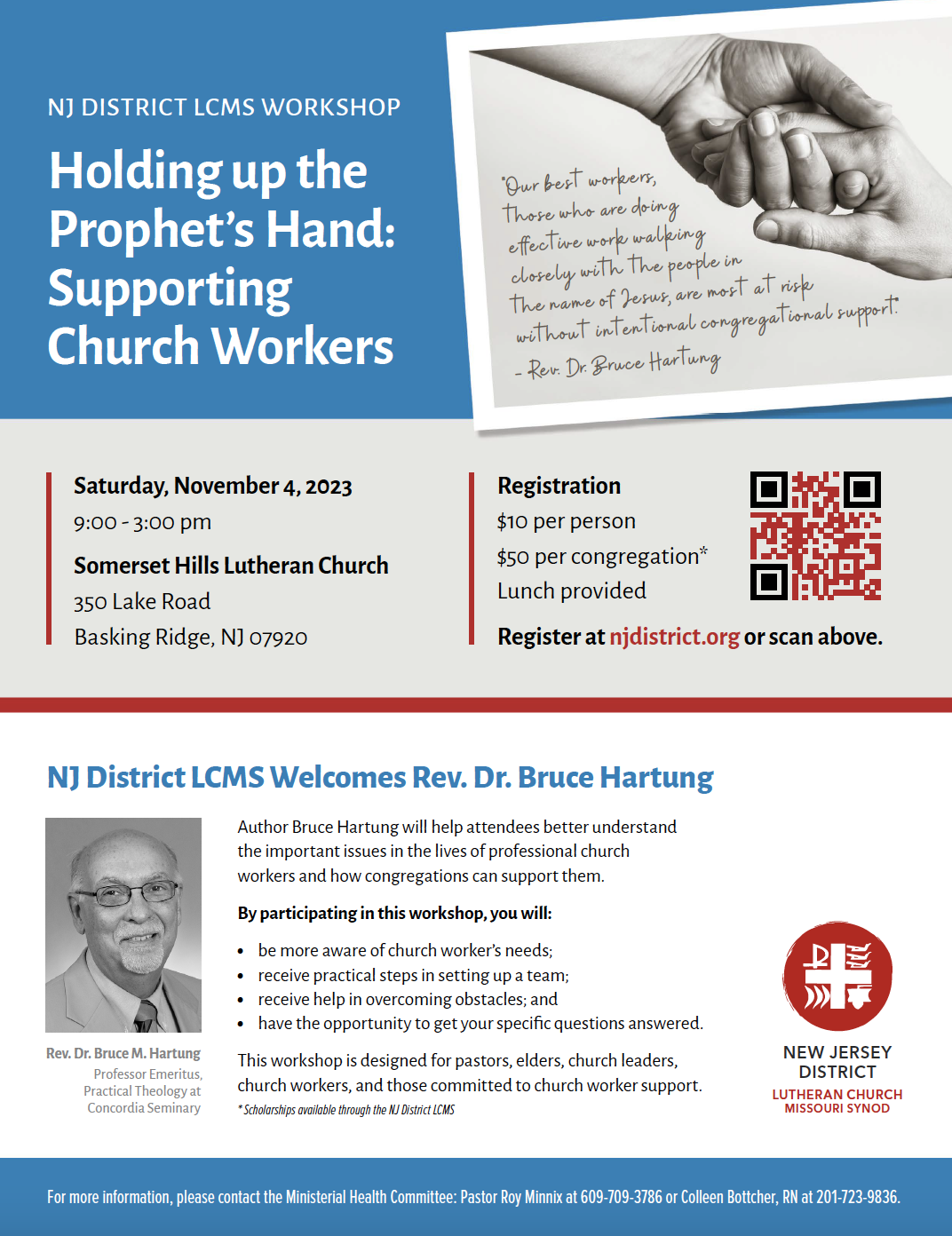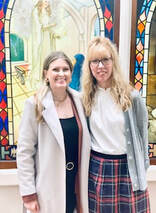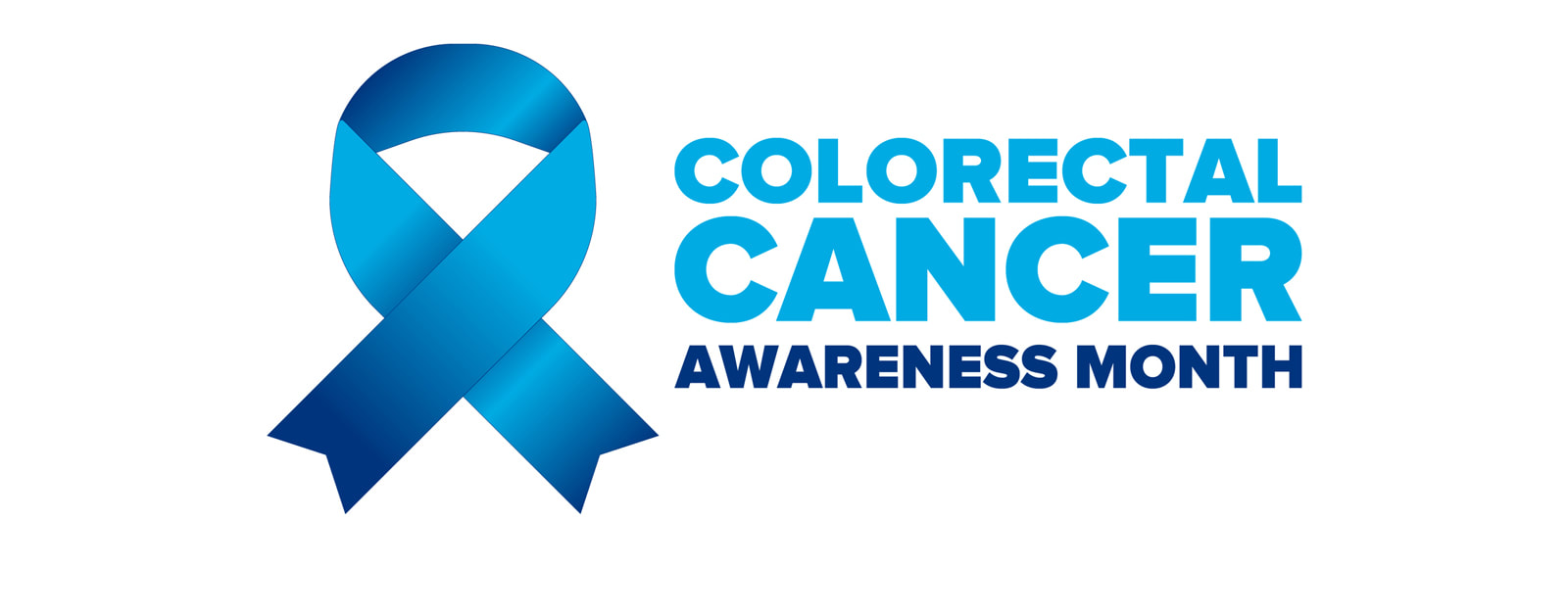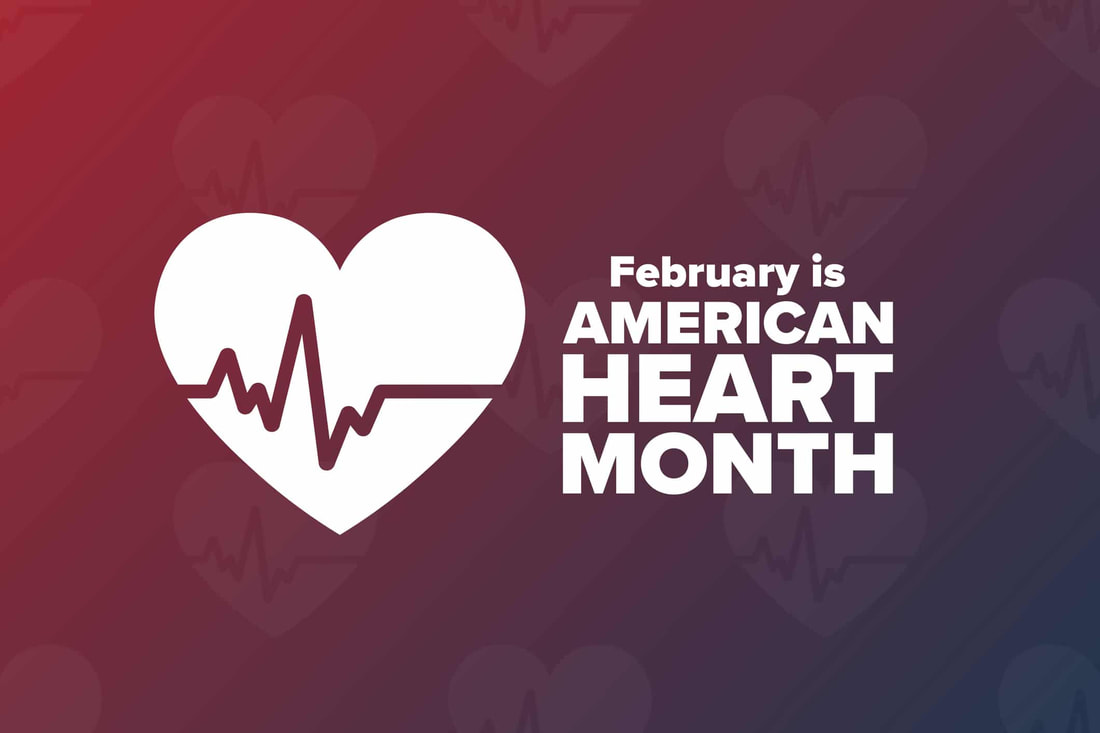|
NJ District LCMS Parish Nurse and Adult Ministries Blog Part 3 of our 3 month Heart Health series~ Nutrition for Heart Health “Pumping the Brakes on Heart Failure” Last month, we spoke about what Heart Failure looks like clinically, as well as treatment and tips in relation to stress management and reduction. In this final month of the heart health series, we will also be discussing a heart healthy diet and nutrition, which is so vital to heart health.
Ready to start your heart-healthy diet? Here are seven tips to get you started towards a healthier heart! You might know that eating certain foods can raise your heart disease risk. Even though changing your eating habits can be tough, you can take simple steps to get started today. Whether you've been eating unhealthy for years or you simply want to fine-tune your diet, find out which foods to eat more of and which foods to limit. You'll soon be on your way toward a healthier diet for your heart. 1. Control portion sizes How much you eat is just as important as what you eat. Overloading your plate, taking seconds and eating until you feel stuffed can lead to eating more calories than you should. Portions served in restaurants often are larger than anyone needs. Follow a few simple tips to control food portion size. These tips can help you shape up your diet as well as your heart and waistline: Use a small plate or bowl to help control your portions (this is something we do in our home, and it really works!) Eat more low-calorie, nutrient-rich foods such as fruits and vegetables. Eat smaller amounts of high-calorie, high-sodium foods. These include refined, processed and fast foods. It's also important to keep track of the number of servings you eat. Keep these points in mind: A serving size is a specific amount of food. It's defined by common measurements such as cups, ounces or pieces. For example, one serving of pasta is about 1/3 to 1/2 cup, or about the size of a fist. A serving of meat, fish or chicken is about 2 to 3 ounces. That's about the size and thickness of a deck of cards. The recommended number of servings in a food group may vary. It depends on the specific diet or guidelines you're following. 2. Eat more vegetables and fruits Vegetables and fruits are good sources of vitamins and minerals. They're also low in calories and rich in fiber. Vegetables and fruits, like other plants or plant-based foods, contain substances that may help prevent heart disease. Eating more fruits and vegetables also may help you eat less higher calorie food. Some examples of high-calorie foods are meat, cheese and snack foods. Keep fruits and vegetables washed and ready to eat, so you will be more inclined to snack on health items. 3. Choose whole grains Whole grains are good sources of fiber and other nutrients that play roles in heart health and controlling blood pressure. You can get more whole grains by making simple swaps with refined grain products. Or try a whole grain you haven't had before. Healthy choices include whole-grain farro, quinoa and barley. At least half of the grains you eat should be whole grains. An easy way to add healthy fat — and fiber — to your diet is to use ground flaxseed. Flaxseeds are small brown seeds that are high in fiber and healthy fats called omega-3 fatty acids. Studies have shown that flaxseed lowers unhealthy cholesterol levels in some people. You can grind flaxseeds in a coffee grinder or food processor. Then stir a teaspoon of the ground flaxseed into yogurt, applesauce or hot cereal. 4. Choose low-fat protein sources Lean meat, poultry and fish; low-fat or fat-free dairy products; and eggs are some of the best sources of protein. Choose lower fat options, such as skinless chicken breasts rather than fried chicken patties. And choose skim milk rather than whole milk. Fish is healthier than high-fat meats. Certain types of fish are rich in omega-3 fatty acids, which can lower blood fats called triglycerides. You'll find the highest amounts of omega-3 fatty acids in cold-water fish, such as salmon, mackerel and herring. Other sources are flaxseed, walnuts, soybeans and canola oil. Legumes — beans, peas and lentils — also are good low-fat sources of protein. They contain no cholesterol, making them good substitutes for meat. Eating plant protein instead of animal protein lowers the amounts of fat and cholesterol you take in. It also boosts how much fiber you get. 5. Limit and reduce sodium and salt Sodium is a mineral. It’s found naturally in some foods, such as celery or milk. Food makers also may add sodium to processed foods, such as bread and soup. Eating foods with lots of added sodium can lead to high blood pressure. So can using table salt, which contains sodium. High blood pressure is a risk factor for heart disease. Limiting salt and sodium is a key part of a heart-healthy diet. The American Heart Association recommends that adults: Have no more than 2,300 milligrams (mg) of sodium a day. That's about a teaspoon of salt. Ideally have no more than 1,500 mg of sodium a day Limiting the amount of salt you add to food at the table or while cooking is a good first step. But much of the sodium you eat comes from canned or processed foods. These include soups, baked goods and frozen dinners. Eat fresh foods and make your own soups and stews to lower the amount of sodium you eat. If you like the convenience of canned soups and prepared meals, buy products with reduced sodium or no added salt. Be wary of foods that claim to be lower in sodium. They may have less sodium than the original recipe but still be high in sodium. You may wonder if sea salt is a better option than regular table salt. Sea salt has the same nutrition as regular salt. Another way to eat less sodium is to choose your condiments carefully. Many condiments are available in reduced-sodium versions. Salt substitutes can add flavor to your food with less sodium. (More on sodium when we talk about DASH) 6. Plan ahead: Create daily menus Create daily menus using the six tips listed above. When you choose foods for each meal and snack, focus on vegetables, fruits and whole grains. Choose lean proteins and healthy fats, and limit salty foods. Watch your portion sizes and add variety to your menu choices. For example, if you have grilled salmon one evening, try a black bean burger the next night. This helps ensure that you'll get all of the nutrients the body needs. Variety also makes meals and snacks more interesting. 7. Have a treat once in a while It's OK to treat yourself every now and then. A candy bar or handful of potato chips won't derail your heart-healthy diet. But don't let treats turn into an excuse for giving up on your healthy-eating plan. If you overeat treats once in a while rather than often, you'll balance things out over the long term. What's important is that you eat healthy foods most of the time. As a parish nurse, whenever I am discussing heart health, I share about the DASH diet. The DASH diet has been among the top diets recommended by physicians for heart health and lowering your blood pressure for years. As with any diet, please discuss your plans with your cardiologist or internist before beginning your diet: DASH stands for Dietary Approaches to Stop Hypertension. The DASH diet is a healthy-eating plan designed to help prevent or treat high blood pressure. It also may help lower cholesterol linked to heart disease, called low density lipoprotein (LDL) cholesterol. High blood pressure and high LDL cholesterol levels are two major risk factors for heart disease and stroke. Foods in the DASH diet are rich in the minerals potassium, calcium and magnesium. The DASH diet focuses on vegetables, fruits and whole grains. It includes fat-free or low-fat dairy products, fish, poultry, beans and nuts. The diet limits foods that are high in salt, also called sodium. It also limits added sugar and saturated fat, such as in fatty meats and full-fat dairy products. DASH diet and sodium The standard DASH diet limits salt to 2,300 milligrams (mg) a day. That amount agrees with the Dietary Guidelines for Americans. That's about the amount of sodium in 1 teaspoon of table salt. A lower sodium version of DASH restricts sodium to 1,500 mg a day. You can choose the version of the diet that meets your health needs. If you aren't sure what sodium level is right for you, talk to your health care provider. DASH diet: What to eat The DASH diet is a balanced eating plan that gives choices of what to eat. The diet helps create a heart-healthy eating style for life. There's no need for special foods or drinks. Foods in the diet are at grocery stores and in most restaurants. When following DASH, it is important to choose foods that are: Rich in potassium, calcium, magnesium, fiber and protein. Low in saturated fat. Low in salt. DASH diet: Suggested servings The DASH diet provides daily and weekly nutritional goals. The number of servings depends on daily calorie needs. Here's a look at the recommended servings from each food group for a 2,000-calorie-a-day DASH diet: Grains: 6 to 8 servings a day. One serving may be 1/2 cup of cooked cereal, rice or pasta, 1 slice of bread or 1 ounce dry cereal. Vegetables: 4 to 5 servings a day. One serving is 1 cup raw leafy green vegetable, 1/2 cup cut-up raw or cooked vegetables, or 1/2 cup vegetable juice. Fruits: 4 to 5 servings a day. One serving is one medium fruit, 1/2 cup fresh, frozen or canned fruit, or 1/2 cup fruit juice. Fat-free or low-fat dairy products: 2 to 3 servings a day. One serving is 1 cup milk or yogurt, or 1 1/2 ounces cheese. Lean meats, poultry and fish: six 1-ounce servings or fewer a day. One serving is 1 ounce of cooked meat, poultry or fish, or 1 egg. Nuts, seeds, or dry beans and peas: 4 to 5 servings a week. One serving is 1/3 cup nuts, 2 tablespoons peanut butter, 2 tablespoons seeds, or 1/2 cup cooked dried beans or peas, also called legumes. Fats and oils: 2 to 3 servings a day. One serving is 1 teaspoon soft margarine, 1 teaspoon vegetable oil, 1 tablespoon mayonnaise or 2 tablespoons salad dressing. Sweets and added sugars: 5 servings or fewer a week. One serving is 1 tablespoon sugar, jelly or jam, 1/2 cup sorbet or 1 cup lemonade. DASH diet: Alcohol and caffeine Drinking too much alcohol can increase blood pressure. The Dietary Guidelines for Americans recommends that men limit alcohol to no more than two drinks a day and women to one or less. The DASH diet doesn't talk about caffeine. How caffeine affects blood pressure isn't clear. But caffeine can cause blood pressure to rise at least briefly. If you have high blood pressure or if you think caffeine affects your blood pressure, think about cutting down. You might talk to your health care provider about caffeine. Take aim at salt: The foods at the center of the DASH diet are low in salt. So following the DASH diet is likely to lower salt intake. To further reduce salt: Read food labels and choose low-salt or no-salt-added options. Use salt-free spices or flavorings instead of salt. Don't add salt when cooking rice, pasta or hot cereal. Choose plain fresh or frozen vegetables. Choose fresh skinless poultry, fish and lean cuts of meat. Eat less restaurant food. When eating at restaurants, ask for dishes with less salt and ask not to have salt added to your order. (DASH Diet tips from Mayo Clinic) As you cut back on processed, salty foods, you might notice that food tastes different. It can take time for your taste buds to adjust. But once they do, you might prefer the DASH way of eating. And you'll be healthier for it! 1 Thessalonians 5:16-18 "Be joyful always; pray continually; give thanks in all circumstances, for this is God’s will for you in Christ Jesus”. Questions or comments please reach out to Colleen. In His joy and service, Colleen Bottcher RN, BSN, FCN NJ District LCMS Parish Nurse Rep. email: [email protected] Cell# 201-723-9836
0 Comments
“Pumping the Brakes on Heart Failure”
Last month, we spoke about what Heart Failure looks like clinically, as well as treatment and tips. This month in the heart health series, we will also be discussing ways to manage and reduce your stress level, which is so vital to heart health. While many people think heart failure means the heart stops beating, it actually means the heart is unable to pump blood and oxygen effectively throughout the body. The disease can begin suddenly after an injury or illness, or due to a medical condition that damages the heart. Most often, heart failure develops over time, and it can be debilitating if not properly treated. Heart failure can be reversed if treated properly. Dr. Kanika Mody, Advanced Heart Failure Cardiologist at Hackensack University Medical Center shares warning signs of heart failure, and how to help: What Heart Failure Looks Like: 1. Shortness of breath at rest or during an activity 2. Fatigue or inability to exert energy 3. Coughing or wheezing 4. Swelling and weight gain from fluid buildup in the ankles, lower legs, or abdomen 5. Nausea or loss of appetite 6. Difficulty sleeping on your back 7. Swelling in the veins of the neck 8. Frequent need to urinate If you are experiencing any of these symptoms, consult your physician immediately. Do not hesitate to call 911 if you or a loved one is experiencing: 1. Difficulty breathing 2. Chest pain 3. Fainting, sudden dizziness, or loss of consciousness These can be symptoms of a heart attack and require immediate emergency care. Heart Failure Treatment and Tips: The good news is that heart failure can at times be reversed. Medications can be prescribed to treat heart failure and strengthen your heart muscle, as well as reduce edema and fluid retention. Other steps you can take: 1. Quit smoking (and vaping) 2. Reduce salt/sodium intake 3. Increase physical activity, especially aerobic activity: WALK! 4. Manage/reduce your stress level (Tips on stress management below) 5. Lose weight (Hackensack Meridian Health Winter 2024 publication) As a Parish Nurse, there are a few suggestions that I try to offer to individuals that I am blessed to meet and serve Christ with: 1. Every individual age 40 or above, should begin seeing a cardiologist. It is never too early to begin heart screenings, blood work (CBC and CMP, lipids levels, cholesterol screenings, and more) and echocardiograms to establish what your baseline heart health is. 2. Everyone should begin an aerobic exercise regime, such as walking, or stationary cycling, 30-40 minutes five times per week, after clearing this activity with their physician. Having a walking partner, either a neighbor, or a fellow church member, is an excellent way to promote your daily exercise habits. 3. Your congregations can begin walking groups, low impact exercise groups such as stretch classes, or host guest speakers on heart health, nutrition and stress management, and more! (More on nutrition and heart health in part 3 of this heart health series) 4. Pray for one another! Encouraging one another in Christ can strengthen your perseverance to improve your health! God cares about your physical, spiritual and emotional health! Part 2: Three practical habits to reduce and manage your stress and anxiety: 1. Adopt Healthy Lifestyle Habits When you take care of our body, your mind can usually cope better with stress and anxiety. Adopting these healthy lifestyle habits can help you manage your anxiety: * Regulating your sleep~ Adults need 7-9 hours of sleep on average each night to ensure your physical and emotional self can function at its best. *Eating a healthy diet~ We will be discussing this in part 3 of this series. For now, it is important to know that stress hormones urge you to eat foods high in fat and sugar, so resisting that urge and eating healthier foods not only helps your body, but it helps your mind as well. *Staying well hydrated~ drinking water throughout the day can improve your mood, and regulate and reduce headaches, which can help you cope better with stress. *Exercise regularly~ Start your church walking groups this Spring! *Limiting your alcohol intake~ Some people drink alcohol to feel calmer, but it doesn't help in the long run. Your stress and anxiety levels can actually increase as the alcohol wears off. 2. Stay in the Present: Being “in the moment” can reduce stress and anxiety by limiting unhealthy thoughts or “worries”. Strategies for staying in the moment: * Focus on your breath when you need to calm down and count backwards from 10-1. Deep breathing works to turn off your body’s stress response. *Pray. Spend time in God’s Word. Attend worship regularly. * Interact with a loved one, or a pet. * Play relaxing music, hymns, or play a musical instrument. 3. Challenge your thoughts and feelings of anxiety and stress: It’s important to recognize that your thoughts about yourself and your circumstances are not always based on facts. * Dial back to the present moment and don’t try to predict the future. *Check your facts * Replace negative thinking with positive thoughts. Read scripture and remain in God’s Word. * Keep a journal, focus on gratitude and prayer in that journal *See a therapist. Working with a therapist can be a support system as you manage and reduce your anxiety and stress, thereby improving your heart health! You are never alone! Talk with your pastor, or church member, or loved one! 1 Thessalonians 5:16-18 "Be joyful always; pray continually; give thanks in all circumstances, for this is God’s will for you in Christ Jesus”. Questions or comments please reach out to Colleen. In His joy and service, Colleen Bottcher RN, BSN, FCN NJ District LCMS Parish Nurse Rep. email: [email protected] Cell# 201-723-9836 Important Phone Numbers: NJ Hope Line and suicide prevention: 855-654-6735 NJ Mental Health Cares 866-202-HELP National Suicide Hotline: 800-273-8255 Emergency: 911 While many people think heart failure means the heart stops beating, it actually means the heart is unable to pump blood and oxygen effectively throughout the body. The disease can begin suddenly after an injury or illness, or due to a medical condition that damages the heart. Most often, heart failure develops over time, and it can be debilitating if not properly treated.
Heart failure can be reversed if treated properly. Dr. Kanika Mody, Advanced Heart Failure Cardiologist at Hackensack University Medical Center shares warning signs of heart failure, and how to help: What Heart Failure Looks Like: 1. Shortness of breath at rest or during an activity 2. Fatigue or inability to exert energy 3. Coughing or wheezing 4. Swelling and weight gain from fluid buildup in the ankles, lower legs, or abdomen 5. Nausea or loss of appetite 6. Difficulty sleeping on your back 7. Swelling in the veins of the neck 8. Frequent need to urinate If you are experiencing any of these symptoms, consult your physician immediately. Do not hesitate to call 911 if you or a loved one is experiencing: 1. Difficulty breathing 2. Chest pain 3. Fainting, sudden dizziness, or loss of consciousness These can be symptoms of a heart attack and require immediate emergency care. Heart Failure Treatment and Tips: The good news is that heart failure can at times be reversed. Medications can be prescribed to treat heart failure and strengthen your heart muscle, as well as reduce edema and fluid retention. Other steps you can take: 1. Quit smoking (and vaping) 2. Reduce salt/sodium intake 3. Increase physical activity, especially aerobic activity: WALK! 4. Manage/reduce your stress level (Tips on stress management in part 2 of this series) 5. Lose weight (Hackensack Meridian Health Winter 2024 publication) As a Parish Nurse, there are a few suggestions that I try to offer to individuals that I am blessed to meet and serve Christ with: 1. Every individual age 40 or above, should begin seeing a cardiologist. It is never too early to begin heart screenings, blood work (CBC and CMP, lipids levels, cholesterol screenings, and more) and echocardiograms to establish what your baseline heart health is. 2. Everyone should begin an aerobic exercise regime, such as walking, or stationary cycling, 30-40 minutes five times per week, after clearing this activity with their physician. Having a walking partner, either a neighbor, or a fellow church member, is an excellent way to promote your daily exercise habits. 3. Your congregations can begin walking groups, low impact exercise groups such as stretch classes, or host guest speakers on heart health, nutrition and stress management, and more! 4. Pray for one another! Encouraging one another in Christ can strengthen your perseverance to improve your health! God cares about your physical, spiritual and emotional health! 1 Thessalonians 5:16-18 "Be joyful always; pray continually; give thanks in all circumstances, for this is God’s will for you in Christ Jesus. " In His joy and service, Colleen Bottcher RN, BSN, FCN NJ District LCMS Parish Nurse Rep. email: [email protected] Holding Up the Prophet’s Hand Workshop with Rev. Dr. Bruce Hartung On Saturday, November 4th the NJ District LCMS hosted an informative and dynamic workshop with Rev. Dr. Bruce Hartung. This wonderful workshop was held at Somerset Hills Lutheran Church in Basking Ridge, NJ. This event was sponsored by the NJ District LCMS, the Ministerial Health Committee, and the NJ LWML.
Throughout the conference, Dr. Bruce Hartung provided intentional, strategic and proactive methods to support our pastors, church workers and volunteers of all types. Through Dr. Hartung’s presentation, discussion and small group work, we worked as congregational teams to discuss tangible ways to plan ahead intentionally with health and wellness strategies, provide safe spaces for pastors and church workers to share, how to form a Worker Support Team, how to establish clear boundaries for church workers and pastors while promoting pastor and congregational health and wellness, and intentional ways to combat burnout and isolation. Congregational team members present were able to participate in small groups and take a Social Support Functions survey, and then share our immediate responses with feedback to one another. This allowed for each team to examine which congregation members may fulfill these functions for our church workers, and how important each function of the social support system is personally to each church worker. Social Support Functions include listening, technical support, technical challenge, emotional support, emotional challenge and sharing social reality. We learned how vital these 6 aspects are to a thriving, healthy ministry plan. Thank you to all who attended on November 4th! This workshop was recorded, and copies of the powerpoint presentation are available. We will be working on a way of distributing these for those who could not attend, or who have further questions. We are so thankful to all of the congregations who at the close of the workshop, shared three immediate, intentional strategies they planned to implement and share with the leaders of their congregations. Thanks be to God for your ministry planning! A special thank you to Rev. Bishop Stephen Gewecke, NJ District LCMS President! A warm thank you to Elaine Schleifer, members of the Ministerial Health Committee: Rev. Deric Taylor, Rev. Richard Vossler, Rev. Roy Minnix, Rev. Bob Holsten, Rev. Richard Izzard and Colleen Bottcher RN; Arlene Price and the NJ LWML, and Rev. Dan Fenco and Somerset Hills Lutheran Church, and to all of those individuals who assisted along the way. Thank you to our congregational Church Presidents and Elders, who promoted this event tirelessly! We look forward to hearing from the congregations who participated that day! We will be reaching out to you to see how your intentional strategies have worked, and to see how we may help you further. In His joy and service, Colleen Bottcher RN, BSN, FCN NJ District LCMS Parish Nurse Rep. NJ District LCMS Parish Nurse and Adult Ministry Blog A Lutheran Hour Ministries Project Connect Spotlight Hope and Healing: Surviving Breast Cancer Blessings to you this Fall! October is Breast Cancer Awareness month, and we would like to share more about tangible ways your congregations can offer support. One of my favorite ministries that we have implemented through our Congregational Health Ministry is the “Project Connect" booklet ministry. A little about this ministry below:
"Bring hope to your community through Project Connect — an indispensable, on-site, booklet ministry resource that uses a display (Rotating Booklet Stand) of pocket-sized, topical booklets to promote outreach. There are also some booklets for equipping your congregation's members to share their faith. Each of the more than 50 booklets available is written from a Christian perspective and addresses a variety of topics, from forgiveness and the after-life to depression and anger management. Many have been translated into Spanish too." (lhm.org) Project Connect also offers booklets for youth. During October, Project Connect is a wonderful resource for Breast Cancer awareness month with their booklet, Hope and Healing. This booklet highlights scripture throughout the Bible that speaks to His healing, love, and care of us. This booklet also walks through the journey of a breast cancer diagnosis, what to expect physically, emotionally, and spiritually, and gives tangible examples of how to support one another. Many congregations offer the Project Connect Booklet Ministries, and along with a meal ministry program, prayer shawl program, and visitation program, congregations can be a supportive and comforting presence to those families that are affected by a breast cancer diagnosis, or any cancer diagnosis. So please, remember to go for your annual Mammogram, screening ultrasounds if needed, and do your monthly self-checks. Early diagnosis is key to good breast cancer outcomes. Gently remind your loved ones as well. In His joy and service, Colleen Bottcher RN, BSN, FCN NJ District LCMS Parish Nurse serving at: Our Savior Lutheran Church 22-15 Broadway Fair Lawn, NJ 07410 email [email protected] Ephesians 6:10-11 Be strong in the Lord and in the strength of His might. Put on the whole armor of God, that you may be able to stand against the schemes of the devil. This summer, I celebrated my 20th year of nursing! Looking back over the years, beginning on a medical-surgical unit, then community health nursing, caring for adults with developmental disabilities and school nursing, I remember feeling well equipped and skilled to begin my journey as a Parish Nurse. The joys and heartaches that I have experienced serving as a Parish Nurse are very well explained in Dr. Bruce Hartung’s book “Holding up The Prophet’s Hand”. One of my favorite excerpts from this book about supporting church workers below:
“ ...I see church workers at an increased risk for sadness, despair, stress, frustration, cynicism, anger and disappointment... Day by day, these workers deal with the crises of others -unemployment, financial distress, personal illnesses and the death of loved ones...Stress often increases when one’s vocation asks the worker to connect the challenging human experience with the Gospel of Jesus Christ. Church workers most often have personal relationships with those they serve. Unlike counselors, whose clients come and go, or firefighters, who meet the emergency needs and then leave the scene, church workers walk closely with those they serve in day-by-day, ongoing relationships.(Hartung 8,9) As church workers of all kinds, we need to be intentional about supporting one another. Through this intentional support, we can vastly improve the health of our congregations and our pastors, and therefore enable us to be better equipped at sharing the Gospel of Jesus Christ as we serve. Join us on Saturday, November 9th from 9am-3pm, as we gather together as church workers, elders, pastors, parish nurses, women’s ministry leaders, educators and church staff (and all types of church workers) for a seminar on “Holding Up The Prophet’s Hand” hosted by Dr. Bruce Hartung and sponsored by the NJ District LCMS and the Ministerial Health Committee. Location: Somerset Hill Lutheran Church, Basking Ridge, NJ. All details are included in the flier below, and on the Grapevine Newsletter. In His joy and service, Colleen Bottcher RN, BSN, FCN NJ District Parish Nurse Rep Adult Ministries & The Ministerial Health Committee I began guiding High School Bible Study two years ago at Our Savior Lutheran Church, in Fair Lawn, NJ.
I remember feeling this was a daunting task, that I prayed about for months, and really wanted to do a great job imparting wisdom and guidance to our High Schoolers, through the study of God’s Word. Thanks be to God, we were off to a great start! Often, the youth taught me more than I would teach them, and each week the Holy Spirit led us in a beautiful study of His word. During my second year of leading our weekly High School Bible Study, a few weeks into the Fall, our High Schoolers began to have many, many questions. They wondered and inquired about sharing their faith with friends, they prayed for their teachers who were struggling with health or family concerns. They wondered aloud about how they would ever pick a college, or how they would pick their major in college. Some wondered whether college was the right path for them. I immediately began to pray for their needs, and asked God to help me answer all of their questions, or at the very least, guide them as best I could. A few weeks passed, and God presented a solution! What if I asked the congregation to stop by High School Bible Study, during the last 30 minutes of our study each week, and perhaps share their own personal journey through High School and either college or the work force, and how God had guided them? I submitted a little blurb to our weekly bulletin, asking for volunteers to come share with our High Schoolers. Within weeks, we had so many volunteers come forward, that each week for the remainder of Winter and Spring was filled with excited OSLC church members, ready to share their own personal journey with our High Schoolers, and how their faith guided them. Praise God! What I didn’t anticipate was how much wisdom, honesty, and diverse stories our church members had to share, and how much thought our High Schoolers would put into preparing the best questions to ask their guest speakers each week. So many faith stories touched on high school and college or trade school years. Our guest speakers were open and honest to include regrets, successes, failures (no true failures, we learn from all of our decisions), determination, joys, and mental health struggles. Throughout all of these topics, God’s love weaved through their journey’s and their faith strengthened with each challenge. Thank you to our guest speakers, which included many educators (including President Gewecke’s daughter Amy), NBA management, mental health clinicians, tradesmen, guidance counselors, a high school vice principal, and sports announcers to name a few! Thanks be to God for sharing your faith story with our youth! Perhaps your congregation will offer the same program? Or perhaps your congregation has already done a similar sharing of faith stories! Please email me if you are willing to share! Psalm 3:13 Blessed is the one who finds wisdom, and the one who gets understanding. In His joy, Colleen Bottcher RN, BSN, FCN NJ District LCMS Parish Nurse [email protected] 2 Timothy 1:7 For God gave us a spirit not of fear, but of power and love and self-control. Over the last ten years of serving as a Parish Nurse, one of the most frequent topics that congregation members, neighbors, friends, family, and youth have approached me about are Mental Health topics. In recent years, at Our Savior Lutheran Church in Fair Lawn, our Health Ministry program began a Project Connect Ministry. Many LCMS congregations that I have visited over the years also offer this ministry to their congregation and community. Project Connect is a wonderful resource for your congregation and community, providing booklets that individuals can take confidentially, covering a wide variety of mental health, spiritual health and physical wellness topics, all created by Lutheran Hour Ministries. Project Connect brings hope to your community through an indispensable, on-site, booklet ministry resource that uses a display of pocket-sized, topical booklets to promote outreach. There are also some booklets for equipping your congregation's members to share their faith. Each of the more than 50 booklets available is written from a Christian perspective and addresses a variety of topics, from forgiveness and the after-life to depression and anger management. Many have been translated into Spanish too. When placed in a church narthex or fellowship hall, these booklets are available for visitors on their time, giving them resources when they need them. Each booklet has space to include your church's information -- complete with worship times if needed and address directions. (Lutheran Hour Ministries) At Our Savior Lutheran Church Fair Lawn, we place the booklets by one of our entrances, and each booklet is labeled with our church contact information, in case anyone wants to talk further with Pastor Taylor or a church worker. Lutheran Hour Ministries recently added several booklets focused on mental health topics. We recently added a new booklet Journey Through Anxiety, which is a 53 page in depth booklet detailing scripture, true stories, and focused interventions designed to address anxiety and healing. I am often told by a church member that they have taken a booklet to share with a co-worker or neighbor. Praise God! In Northern NJ, there are many Christian Counseling centers, some I have listed below. I would love to hear from you if you can recommend a Lutheran counselor, or a Christian counselor that you highly recommend. Anything you share with me will be held in confidence. I hope to build a database of recommended mental health clinicians in all regions of New Jersey. Resources: National Suicide Prevention Hotline Call or Text 988 You can also still use the former hotline number for a mental health crisis or suicidal thoughts: 1-800-273-TALK (8255) 1. Christian Health ~ LiveWell Counseling Wyckoff, NJ 201-848-5200 Christian counseling for anxiety, depression, mood disorder, psychiatric and medication assessment, panic disorder, parenting, bereavement, and addiction counseling and more. 2. Light the Way Counseling Center, LLC Faith based counseling in Midland Park, NJ 201-444-8103 3. Lutheran Counseling Center 132 Jefferson Ave Mineola, NY. 11501 800-317-1173 (Most counselors are licensed to counsel only in NY, however there are some who hold a NJ license as well) In His joy and service, Colleen Bottcher RN, BSN, FCN NJ District LCMS Parish Nurse cell# 201-723-9836 email: [email protected] March is National Colorectal Cancer Awareness MonthColorectal cancer is the second deadliest cancer in the United States. Every March, National Colorectal Cancer Awareness Month spotlights this disease and inspires more people to get screened. Two reasons why getting screened matters:
Screening can find the warning signs of colon and rectal cancer, letting doctors take action to prevent the disease. Screening can also find colorectal cancer early, when treatment is most effective. People should start getting screened regularly at age 45. However, you may need to be tested earlier or more often than other people if you have inflammatory bowel disease such as Crohn’s disease or ulcerative colitis, a personal or family history of colorectal cancer or colorectal polyps, or a genetic syndrome such as familial adenomatous polyposis (FAP) or hereditary non-polyposis colorectal cancer (Lynch syndrome). If you think any of these things is true for you, ask your doctor when and how often you should be tested. Common questions people may have: 1. The only screening test for colorectal cancer is colonoscopy? The correct answer is: False Adults at average risk have several types of screening test options for colorectal cancer, including some that can be done at home. Learn about all of the screening test options and talk to your doctor about which is right for you. The best test is the one you do! 2. If you don’t have any symptoms, it means you don’t have colorectal cancer. The correct answer is: False Colorectal polyps and colorectal cancer don’t always cause symptoms, especially early on. But screening can find polyps and colorectal cancer even before symptoms appear. That’s why getting screened regularly for colorectal cancer is so important. What can you do as a congregation? Hang fliers and put reminders in your church bulletin about Colorectal Cancer Awareness Month. Encourage your loved ones and congregation members to see their physicians and ask about appropriate screenings. Invite your local hospital speakers bureau for a seminar on Colorectal Cancer Awareness. Some studies suggest that people may reduce their risk of developing colorectal cancer by increasing physical activity, keeping a healthy weight, limiting alcohol consumption, and avoiding tobacco. Call for your screening appointment today! In His joy and service, Colleen Bottcher RN, BSN, FCN NJ District LCMS Parish Nurse Tips for a Healthy Heart Proverbs 4:23 Above all else, guard your heart, for it is the wellspring of life.
February is American Heart Month. Heart disease is the leading cause of death of Americans, taking the lives of 2,200 people each day. In addition, 103 million adults have high blood pressure and 6.5 million are living with heart failure. While genetic factors do play a part in cardiovascular disease, the good news is 80 percent of cardiovascular diseases may be preventable with education and action. Simple lifestyle changes can make a big impact when it comes to heart health. Show your heart some love with these 8 tips. 1. Stop smoking Quitting smoking is the best thing that can be done for the heart and for overall health. Smoking is the most preventable cause of premature death in the United States, and smokers have a higher risk of developing many chronic disorders, including atherosclerosis, or the buildup of fatty substances in the arteries. When combined with other heart disease risk factors, smoking increases the risks associated with those factors. Quitting is never easy, but there are lots of helpful resources for those looking to start. 2. Know your numbers Maintaining a healthy weight, blood pressure and total cholesterol play a significant role in maintaining a healthy heart. While there are standard guidelines for blood pressure and cholesterol, ideal weight goals are individual to each person. A physician can help determine an appropriate goal weight based on additional factors such as age and height. 3. Screen for diabetes Untreated diabetes can lead to heart disease, among many other complications. Diabetes can be easily detected through a simple blood test and managed a variety of ways under the care of a physician. 4. Get active Heart pumping physical activity not only helps to prevent cardiovascular disease but can also improve overall mental and physical health. The American Heart Association recommends five 30 minute moderate exercise sessions each week. While this may seem daunting, it is important to note that these sessions can be broken up into two or three 10 or 15-minute segments throughout the day. Walking, jogging, biking and swimming are all great forms of exercise. It is important to remember that something is always better than nothing. Opting to take the stairs and parking farther back in the parking lot are great ways to squeeze in activity when the time is short. 5. Build some muscle Strength training compliments cardiovascular exercise by toning muscles and burning fat. In addition, proper strength training can improve daily functional movements, decreasing the chance of injury. The American Heart Association recommends getting in two days of moderate to high-intensity strength training each week. 6. Eat smart A healthy diet full of heart-smart foods is essential to a healthy heart and lifestyle. Salmon, nuts, berries, and oats are just a few of the heart “superfoods” that may help reduce the risk of atherosclerosis. Dark chocolate is also on the list and is a great way to satisfy a sweet tooth (in moderation). 7. Limit junk To reap the full benefits of a heart-healthy diet, it’s important to limit intake of nutrient-poor junk foods. Added sugars, saturated fat and excessive sodium can all negatively impact heart health, as well as overall physical health. These foods, when eaten in excess, can cause weight gain, raise blood pressure and clog arteries, which are all risk factors for heart disease. 8. Stress less Stress increases cortisol, which leads to weight gain, a key risk factor for heart disease. In addition, stress can lead to other unhealthy habits, making it harder to stick to a heart-healthy program. Stress can also decrease overall happiness and increase the risk for anxiety and depression. Many of the items on this list can also help with reducing stress, in addition to practicing positive self-talk and incorporating mindfulness meditation breaks throughout the day. (American Heart Association) February is a great time to try a new heart healthy activity in your congregation. There are many programs a congregation can develop and implement that encourage healthy lifestyle changes, while supporting one another, which can lead to life saving changes in your health. A few ideas for Adult Ministries and Congregational Health Ministries in your congregation include: 1. Hosting a weekly walking group, or encourage church members to walk in pairs. This increases accountability, and also helps make those daily walks much more fun! 2. Host a blood pressure screening at your church! Hypertension is painless, insidious, and often goes undetected for years. Blood pressure screenings quickly detect hypertension, and can encourage individuals to follow-up with their PCP or Cardiologist. 3. Pick a Sunday in February to wear red, to highlight heart health! 4. Host a guest speaker from your local hospital to speak about heart health, or nutrition! Invite families and your community members to attend! 5. Host a blood drive for your town! 6. Offer heart healthy snacks during meetings, events, and Bible Studies, instead of the typical bagels, pastries and high carbohydrate offerings. If you have any questions, please reach out to see how I can help! We would love to hear how your congregation promotes heart health! In His joy and service, Colleen Bottcher RN, BSN, FCN NJ District Parish Nurse email: [email protected] |
Photo from Treadmill Guru

